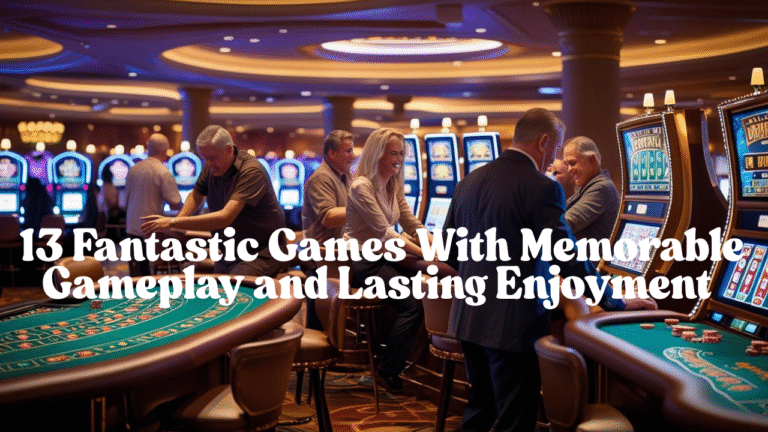Have Fun Games: There is more significance in the small act of play in a time when everyday obligations, screen weariness, and society pressure saps our energy and attention. But not any play; more especially, enjoy pleasurable games.

These dynamic, interesting, and emotionally fulfilling games are meant to entertain as well as to boost spirits, deepen bonds, and hone brains. This blog looks at how fun games could be a catalyst for good change, regardless of your level of gaming—professional looking for a thoughtful escape or casual gamer seeking a mood lift. Having more than ten years of experience writing in the gaming industry, I am providing an expert overview of why these games merit more respect together with analysis, doable advice, starting points, and a useful FAQ section.
What distinguishes the core of have fun games?
Have fun games give user enjoyment, stress reduction, and accessibility first priority unlike competitive eSports titles or sophisticated strategy simulators. Three main goals define the construction of these games:
They allow players leap right into the action by removing sharp learning curves.
By use of vivid images, clever mechanics, and light-hearted challenges, foster positivism.
Suitable for all age groups, skill levels, and time commitments, inclusive design
Fall Guys is one of the social games; Tetris Effect is a puzzle-based hit; Animal Crossing: New Horizons is a creative sandbox; even oddball physics games like Human: Fall Flat are among examples.
5 Good Effects of Fun Game Playing
1. Enhanced Mental Health
Fun activities are great mood booster. To help people relax and lower stress, games like Stardew Valley and Overcooked 2 employ cheerful music, appealing imagery, and non-threatening gameplay.
Short bursts of happy gaming have been found to produce dopamine, the feel-good neurotransmitter, which helps emotional recovery and stress release—especially following a demanding day of cognitive work.
2. Increased Attention and Focus
Although the gameplay seems basic on first glance, many have enjoyable games that slowly improve hand-eye coordination, reaction times, and task-switching ability. Under a fun, competitive shell, Mario Kart 8 Deluxe, for example, demands players to adjust to changing track conditions, employ smart timing for power-ups, and remain visually conscious.
3. Improved Social Attaches
Jackbox Party Pack, Among Us, Keep Talking and Nobody Explodes and other games are meant to be enjoyed with friends or strangers. Especially crucial in remote or hybrid lifestyles, they are great instruments for social connection since they inspire communication, humour, and teamwork.

4. Support of Originality
Many entertaining games give players room for personalising and material driven by them. Players of Roblox and Minecraft, for instance, can create original locations, write scripts, and even publish small-games of their own. Especially for younger audiences, this fosters computer literacy, logical thinking, and creativity.
5. Universal Accessibility for All
The universal design of having fun games is one of their strongest suit. These games don’t reject players depending on reflex speed, hardware performance, or prior experience regardless of their number—9 or 90. Reiterating the premise that fun should be for everyone, titles like Untitled Goose Game and Wobbly Life rely on simple gameplay and humour that anybody can value.
Step-by-Step Guide: How to Get Most Out of Have Fun Games?
Point Out Your Platform.
Choose whether you want to play on browser, PC, console, or mobile device. Key is accessibility; pick something that seems most natural and seamless.
Specify Your Goals
Specify Your Goals
experiment with several genres.
Sample various genres to find what really speaks to you from physics simulations to co-op party games. Allow your compass to be fun, not complicated.
Spend time with friends or family
Many of the most happy gaming experiences come from common laughing. Fun games in multiplayer depend on the chemistry among the players.
Avoid over-gaming
Although these games are meant to have positive effects, moderation is still absolutely crucial. Use them purposefully, as mood resets or breaks, instead of escape.
Examining closely: What makes a game “fun”?
Philosophical Design
Excellent entertaining games combine cartoon aesthetics, colour psychology, and rhythmic appealing music. These components are based in design research and psychology; they are not selected at random.
Development Against Pressure
Many times, fun games deviate from conventional win/loss rules. Rather, they honour discovery, innovation, and involvement. This lets players appreciate the process instead of chasing top marks or rankings.
Emotional Commentary
It’s deliberate when your character stumbles and laughs or when a game congratulates you with animations and happy sounds. Developers leverage this feedback loop to inspire emotional involvement and optimism.
Comedic As a Mechanic
Games like Octodad or Goat Simulator explicitly include slapstick humour into their gameplay systems. These erratic events provide natural delight that sets apart entertaining games from more weighty ones.
FAQs Regarding Have Fun Games:
For which age group are they most suited?
A: everyone. These games are designed for general appeal and easy access. There’s a great game fit for your age—child, teen, or adult.
Are entertaining games more of a time-waster or a benefit?
A: Though they seem light-hearted, having fun games may boost mood, sharpen focus, and develop social ties—making them far from wasted when used deliberately.
Are there enjoyable games available on mobile devices?
A: Yes. On-the-go, games include Crossy Road, Clan Royale, and Monument Valley present fun, aesthetically pleasing, and easily available experiences.
Do I need a strong system to run interesting games?
A: Not very strongly. Many of these games run on low-end browsers or systems. Fun comes before graphic intricacy.
Why would a fun game differ from a casual game?
A: Although most entertaining games are laid back, not all laid-back games are necessarily fun. Fun games centre on creating delight, humour, and positivity—core emotional payoffs outside of mechanics alone.
In summary, the lasting worth of choosing fun.
Pressing pause—and choosing play—has unmatched value among fast-paced lives, algorithmic content, and never-ending responsibilities. Fun games are about recharging, reconnecting, and recentring oneself through pleasure, not about escape.

Knowing their psychological and social advantages will help you deliberately include these games into your schedule, whether that means a five-minute giggle break on your phone or a weekend game night restoring old friendships.
Fun is not a waste of time. Our emotional well-being, cognitive adaptability, and social peace all depend on it fundamentally. And enjoy entertaining games? One happy click at a time, they give all that and more.





